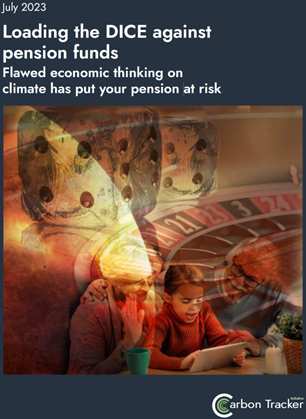This report, which I wrote for Carbon Tracker, has just been released (Keen 2023). The main report can be downloaded from this link, after logging in to Carbon Tracker (which just requires submitting your email and a password—no financial involved):
Loading the DICE Against Pensions – Carbon Tracker Initiative
I’d prefer if you downloaded from there, to enable Carbon Tracker to keep track of how many copies are in circulation. But I’ve also attached it to this post on Patreon (and Substack, if I can work out how to do it!).
There is also a freely downloadable Supporting Document (no login required):
Supporting-Document-To-Rolling-The-DICE-How-Did-We-Get-Here.pdf (carbontracker.org)
This report shows that pension funds have drastically underestimated the damage that climate change will do to pensions, not through any wrongdoing on their part, but because they were advised by consultants who trusted refereed papers published by mainstream economists.

This report extends the research I did for the paper “The appallingly bad neoclassical economics of climate change” (Keen 2020). It details how ludicrously bad research by economists has been taken at face value by pension funds, financial regulators and governments, resulting in the pitifully weak responses that humanity has made to date to the threat of climate change. Comments like the following from a Federal Reserve Governor are a direct product of the juvenile analysis of global warming by mainstream economists:
Climate change is real, but I do not believe it poses a serious risk to the safety and soundness of large banks or the financial stability of the United States. Risks are risks. There is no need for us to focus on one set of risks in a way that crowds out our focus on others. My job is to make sure that the financial system is resilient to a range of risks. And I believe risks posed by climate change are not sufficiently unique or material to merit special treatment relative to others. (Waller 2023, p. 1)
In reality, the threats from climate change are utterly unique in human history, and dwarf the importance of all other risks to our financial, economic and social systems. Assurances by economists that increases in global temperatures of as much as 7ׄ°C will have only a trivial impact on the economy—reducing annual economic growth by a mere 0.02% (Howard and Sylvan 2021, Figure 11, p. 23)—will soon be blown out of the water by the climate itself. The weird weather of 2023 is just a foretaste of what is to come, now that global warming has reached the +1°C levels that concern scientists.
Please download this report (and the Supporting Document), read it, and share it as widely as possible.
Howard, Peter, and Derek Sylvan. 2021. “Gauging Economic Consensus on Climate Change.” In. New York: Institute for Policy Integrity, New York University School of Law.
Keen, Steve. 2020. ‘The appallingly bad neoclassical economics of climate change’, Globalizations: 1-29.
———. 2023. “Loading the DICE against pension funds: Flawed economic thinking on climate has put your pension at risk ” In. London: Carbon Tracker.
Waller, Christopher J. 2023. “Climate Change and Financial Stability.” In Current Challenges in Economics & Finance. Madrid: IE University.